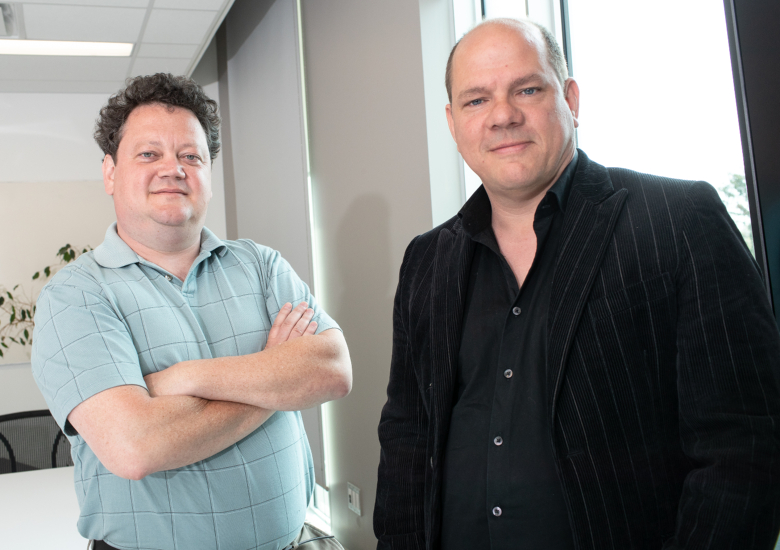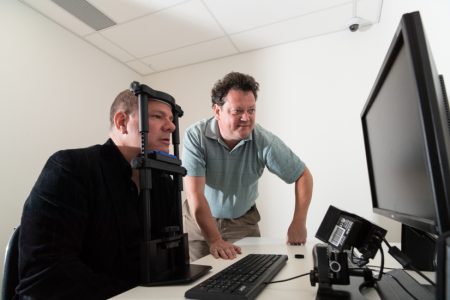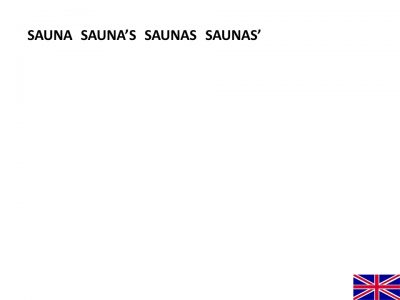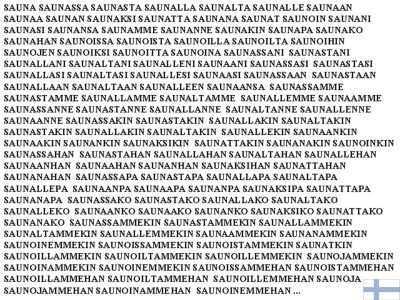Collaborating across an ocean

BY Sara Laux
May 23, 2018
McMaster’s Centre for Advanced Research in Experimental and Applied Linguistics (ARiEAL) has partnered with the University of Turku’s Department of Psychology and Speech-Language Pathology in Finland to collaborate on research on reading and acquiring second languages.
Victor Kuperman, an associate professor in McMaster’s department of Linguistics and Languages, and Raymond Bertram, from the University of Turku, are working together on a variety of projects, largely using eye-tracking technology: using a computer and a camera to measure how someone’s eye moves around on a page of text – how long it stays on an individual word and whether it skips words or goes back, for example.
“Where the eyes are, how they jump from place to place, how long the jumps are, how long the eyes stay in certain positions – this all tells you something about the reading process,” explains Bertram. “What it tells us, exactly, is what we are trying to investigate.”

Kuperman and Bertram are focusing much of their work on adult learners of English. For example, they’ve shown that after reading a word that’s spelled wrong, Finnish and German adults who are learning English have a harder time reading the word in the future, even when it’s spelled right, and also have difficulty spelling the word correctly, even if their spelling was reasonably good. (Kuperman has shown this in native speakers of English as well.) People who were more proficient in English were affected less than those whose proficiency was less secure, because experience makes mental representations of words more stable and more immune to errors.
There’s a very definite practical application to their work.
“With this kind of research, what we’d hope to do is come up with recommendations for adult literacy instructors as well as L2 [second-language] instructors,” says Kuperman. “English and Finnish are beautiful natural controls as two languages – because they’re so different, they give us a way to find out what is universal to both, and what is specific to each language.”
Possible word endings in English for the word “sauna”
 Possible word endings in Finnish for the word “sauna”
Possible word endings in Finnish for the word “sauna”

These types of partnerships are mutually beneficial, according to Kuperman, facilitating not only the exchange of ideas and collaboration on research, but also of graduate students, postdoctoral fellows and faculty.
“The support that we get from McMaster allows us to invite collaborators and allows students to run parallel experiments in two different labs on two different continents,” explains Kuperman.
And being exposed to speakers of other languages is particularly important for monolingual students, Bertram points out – especially those who are studying linguistics.
“It’s often the case that English students only know English, but you get a better meta-linguistic awareness when you have knowledge about other languages,” he says. “Comparing different languages, like English and Finnish, or English and German, gives student a better understanding of how languages could work. This is an important lesson that they’ll take away from being involved in the types of projects that we’re working on together.”


